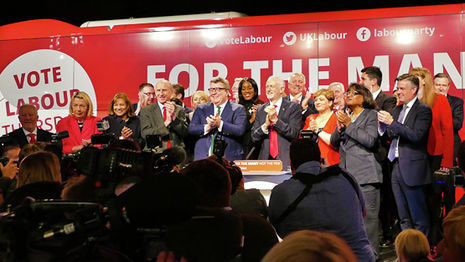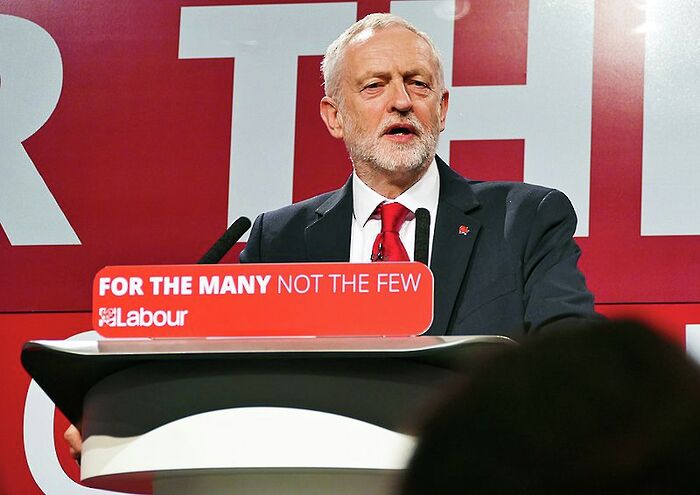Moving back to the centre will not solve Labour’s problems
Reuben O’Connell Booth and Poppy Coburn argue that in order to avoid future electoral defeat, Labour needs to stick to its socialist principles, despite many advocating for a return to the centre-ground.

There is no denying that the result for Labour on December 13th 2019 was utterly devastating. Why was it that Labour was incapable of winning at the ballot box? Luckily, it would seem, there was no shortage of ‘political experts’ claiming to answer this question.
Despite the overwhelming evidence otherwise, this was not a Brexit election, they claimed: no, this was a referendum on socialism itself! Indeed, as soon as the exit poll released, New Labour stalwart Alan Johnson was on ITV shouting “I want Momentum gone.” Many on the Labour right argue that this election was the electorate crying out for a return to the centre.
While Nineties fashion may be back in style, the decade’s politics are assuredly not. The Conservative party lurch to the right, and with demagogic, anti-establishment rhetoric, gerrymandered the election among Brexit lines. In contrast, Labour’s capitulation to the moderate left facilitated a universally unpopular Brexit position. This gave a gleeful Conservative Campaign Headquarters grounds to paint Jeremy Corbyn as an out-of-touch, vacillating elitist. The Labour leadership and all those advocating a so-called ‘People’s Vote’ did not comprehend how powerful this sense of a democratic decision being ignored was. Voters distrusted the flip-flopping of Labour, which created fruitful condition for hollow sloganeering to thrive. Is this evidence the left of the party must be cast back out into the political wilderness?
“Labour must insist upon an unapologetically left-wing programme, and standing up against the right-wing rags and out-of-touch establishment.”
To answer this, we would invite the pundits to look into the other great disappointments of the night. The failure of the Liberal Democrat campaign is a cautionary tale: their simultaneous defeat is a staunch rebuttal of the argument of the opportunistic Labour right. Let us not forget that, in October, the Liberal Democrats were confidently predicting upwards of 100 seats would be won. If we must move to this hallowed center-ground in order to win, why was it that Jo Swinson wasn’t storming to success? Why did the Nandos-eating, salt-of-the earth centrists of the ‘Independent Group’ not win a single seat?
The argument that most voters are long-suffering centrists waiting with bated breath for a ‘Blair type’ to reunite our country under a programme of triangulation and neoliberal economics is entirely disingenuous. The Tories are not racing to the collapsed center, and neither should we.
Polling consistently shows that radical, innovative left-wing programme as an electoral asset for Labour - public ownership of the railways, water, energy and the mail; free personal care for the elderly; a green industrial revolution; a £10 minimum wage and income tax increases for the wealthiest are all extremely popular proposals. The next leader must continue and extend Corbyn’s policy legacy, and not be frightened to defend the strides already made.
Which candidate is best positioned to carry this out? Keir Starmer would have us believe that he is a candidate of the left - but we have good reason to call this into question, despite Starmer being the subject of many a gushing op-ed in liberal publications. His choice to fill many of his staff positions from the right of the party, including several staff who worked on the Owen Smith campaign, begs critique. Equally damning is his record on welfare: in 2013 as DPP he decided to increase the maximum sentence for benefit fraud to 10 years and in 2015 he abstained on the Conservative’s’ Welfare Reform bill. It is no surprise that many of his nominations come from self-styled Blairites in the Parliamentary Labour Party (PLP), as well as an endorsement from Alastair Campell.
Soft left candidates abound in this leadership race. Lisa Nandy and Emily Thornberry are cut from a similar cloth, and their leadership would likely lead to a watering down of the 2019 manifesto. But these candidates are failing to resonate with members to the same extent as Starmer and Rebecca Long-Bailey, meaning they remain firmly in the ‘second tier’ of contenders. It is likely that their supporters will gravitate towards Long-Bailey or join the Labour right and establishment press in closing ranks around Starmer.
The clear candidate of the left is Long-Bailey. She has the strongest socialist credentials, being the architect of Labour’s Green Industrial Revolution, a prominent front-bencher and a member of the Socialist Campaign Group of MPs. Her campaign has gotten off to a strong start, leading with environmental issues and pledging to scrap the House of Lords as well as receiving endorsements from prominent Corbynites, John McDonnell and Momentum. However, she must go further. She must demand greater party democracy, particularly mandatory reselection of MPs, in order to blow the cobwebs out of the PLP.
Her campaign would also benefit from considering the damage the soft left Tom Watson was able to do to Corbyn as Deputy Leader and endorse an ideological ally, preferably fellow Socialist Campaign Group member Richard Burgon for the position, rather than soft left candidate Angela Rayner, who has already declared she is ‘not a Corbynite’.
Defeatism must not overcome us on the Labour left: this is not just a case of following on from Corbyn, but spearheading a growing mass movement that is lurching farther to the left. Labour must insist upon an unapologetically left-wing programme, and standing up against the right-wing rags and out-of-touch establishment. Only a genuinely socialist leader who has learnt the lessons of the last election can win the next.
 Comment / College rivalry should not become college snobbery30 January 2026
Comment / College rivalry should not become college snobbery30 January 2026 Features / Are you more yourself at Cambridge or away from it? 27 January 2026
Features / Are you more yourself at Cambridge or away from it? 27 January 2026 Science / Meet the Cambridge physicist who advocates for the humanities30 January 2026
Science / Meet the Cambridge physicist who advocates for the humanities30 January 2026 News / Cambridge study to identify premature babies needing extra educational support before school29 January 2026
News / Cambridge study to identify premature babies needing extra educational support before school29 January 2026 News / Vigil held for tenth anniversary of PhD student’s death28 January 2026
News / Vigil held for tenth anniversary of PhD student’s death28 January 2026










